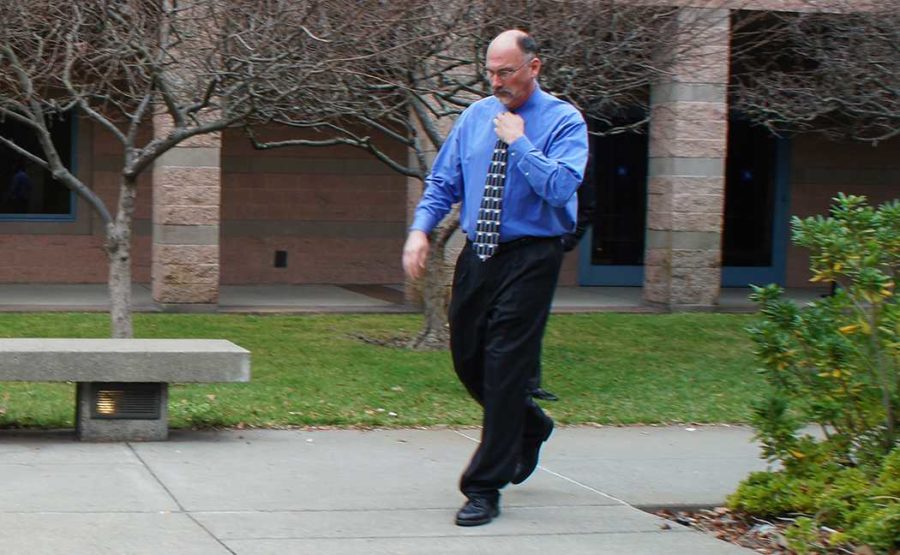Presiding Judge Kenneth Gnoss tossed out two search warrants, while upholding most of a third warrant, during a Feb. 5 hearing in the embezzlement trial against former officer Jeffrey Holzworth, a 28-year veteran at Santa Rosa Junior College District Police.
Gnoss assigned the preliminary trial phase to Judge Jamie Thistlethwaite.
Holzworth held sole responsibility for collecting money from SRJC parking machines and faces 11 charges of receiving stolen property and one charge of embezzlement over $150,000. Holzworth’s wife Karen faces three charges of receiving stolen property and one count of acting as an accessory.
When Santa Rosa Police detectives served their search warrant on Holzworth’s home, they found more than $10,712 in quarters and $1 and $5 bills stashed in 16 canvas bags, five glass jars and a dresser drawer, along with gambling records and casino player’s club cards. The District Attorney’s office claims the total amount Holzworth embezzled around $300,000.
The Feb. 5 hearing focused on the testimony of SRPD detective Mark Azzouni regarding the steps he took in obtaining the search warrants served against Holzworth. Azzouni based his search warrant affidavits on observations made by SRJC District Police Sgt. Stephen Potter in 2006 and 2012.
During a Jan. 15 hearing, Potter testified about his observations of co-worker Holzworth, which formed the basis of the first two search warrants served by SRPD. In 2006 Potter claimed he saw cash inside a partially-unzipped gym bag in the SRJC police locker room. “Out of curiosity,” Potter opened the bag further to verify it as Holzworth’s, then secured it in the evidence locker.
In 2012 Potter got a ride in Holzworth’s private vehicle, noticed the cup holders were full of quarters, and “out of curiosity” opened the center console, which Potter testified held five or six rubber-banded bundles of $1 and $5 bills. Potter drafted his observation into a memo, and new SRJC District Police Chief Matt McCaffrey contacted detective Azzouni, who based his first two search warrant affidavits on Potter’s testimony.
Potter testified he wasn’t conducting an official investigation during those two observations, but merely acting as a concerned employee or coworker. Assistant District Attorney Amy Ariyoshi cited several cases in which police officers, even while in uniform, could make observations without their necessarily being considered part of official police duty. On Feb. 5, Judge Gnoss ruled that on both occasions, Potter had been acting in his capacity as a law enforcement officer, and thus both searches were illegal.
Azzouni’s first two search warrant affidavits, to get Holzworth’s credit report and to place a GPS tracker on Holzworth’s vehicles, based their Statement of Probable Cause entirely on Potter’s observations. Since Potter’s searches were found to be illegal, the “Fruit of the Poisonous Tree” legal doctrine holds that anything found through an illegal search warrant is ‘tainted,’ as well as anything found through an otherwise legal search warrant based on a tainted one.
“There is taint, and it should be suppressed,” said Holzworth’s defense attorney Joe Passalaqua.
Judge Gnoss agreed and excised all of Potter’s observations, which completely eliminated the first two search warrants.
Azzouni based his third search warrant affidavit on observations made by several SRPD detectives and officers who visually tracked him between home, work and other locations, such as a motel room inhabited by a woman charged with prostitution in several states.
When Azzouni served this third search warrant on Holzworth’s home and work place, they discovered over $10,712 in quarters and small bills at his home, $653 in quarters and small bills in his personal truck, $271 in a duffle bag in his work locker and $2,622.75 on Holzworth personally. Since this third affadavit based its Statement of Probable Cause mostly on new observations by Azzouni, even when Judge Gnoss excised Potter’s tainted testimony, enough remained for Azzouni’s third search warrant affidavit for the trial to continue.
“We still have everything,” Ariyoshi said outside the courtroom, referring to all the evidence obtained against Holzworth. In regards to the tossing out the first two search warrants, Ariyoshi said she wants to appeal because “It gives added Fourth Amendment protection to law enforcement officers.”
Holzworth’s preliminary hearing will be scheduled Friday at 9 a.m. in Courtroom 2.



